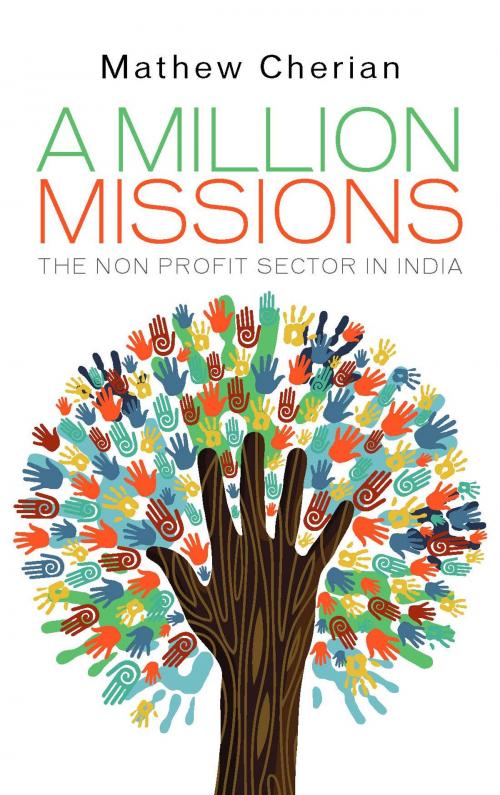A Million Missions
The Non Profit Sector in India
Business & Finance, Economics, Sustainable Development, Industries & Professions, Nonprofit Organizations & Charities, Nonfiction, Social & Cultural Studies, Social Science, Social Work| Author: | Mathew Cherian | ISBN: | 9789384439026 |
| Publisher: | Paranjoy Guha Thakurta | Publication: | June 18, 2014 |
| Imprint: | Language: | English |
| Author: | Mathew Cherian |
| ISBN: | 9789384439026 |
| Publisher: | Paranjoy Guha Thakurta |
| Publication: | June 18, 2014 |
| Imprint: | |
| Language: | English |
After the assassination of Mohandas Karamchand (Mahatma) Gandhi on 30 January 1948, there was a major thrust in favour of voluntary action in India. Six weeks later a few men and women met at Sewagram near Wardha in Maharashtra. They were seeking answers to various questions, including the role that civil society should play in addressing the concerns of the country’s underprivileged and marginalised sections. Thus was born the Sarva Seva Sangh, commonly known as Sarvodaya. Among those present that day were the social reformer and socialist leader, (Lok Nayak) Jayaprakash (JP) Narayan who inspired the formation of the next generation of non-governmental organisations (NGOs) in India. Since then, the voluntary movement in the country has grown impressively.From Raja Ram Mohan Roy, Swami Vivekananda, Mahatma Gandhi and JP to ‘waterman’ Rajendra Singh, all have run NGOs that have changed the way democracy functions and helped ordinary individuals become aware of their fundamental rights and helped them fight to achieve these. Many of the million-plus NGOs in India work among the poorest and marginalised sections of society inspiring hope for a better life and a “new India”. Religious philanthropy has historically played an important role in strengthening the many-faceted fabric of giving in India which is growing stronger by the day. Today’s non-profit sector has influenced the rights-based paradigm of social welfare and economic development thereby furthering grassroots action and democratic foundations. Today NGOs in India are involved in diverse areas of activity, from primary education and basic health to caring for the elderly.This book, for the first time, takes a close look at the working of the country’s voluntary sector and its various aspects. It has been written by an individual who has over four decades of experience working in, and leading, NGOs. The book is an invaluable resource for all those who are interested in this important sector, be they representatives of the corporate sector or donor agencies, government officials or civil society activists.
After the assassination of Mohandas Karamchand (Mahatma) Gandhi on 30 January 1948, there was a major thrust in favour of voluntary action in India. Six weeks later a few men and women met at Sewagram near Wardha in Maharashtra. They were seeking answers to various questions, including the role that civil society should play in addressing the concerns of the country’s underprivileged and marginalised sections. Thus was born the Sarva Seva Sangh, commonly known as Sarvodaya. Among those present that day were the social reformer and socialist leader, (Lok Nayak) Jayaprakash (JP) Narayan who inspired the formation of the next generation of non-governmental organisations (NGOs) in India. Since then, the voluntary movement in the country has grown impressively.From Raja Ram Mohan Roy, Swami Vivekananda, Mahatma Gandhi and JP to ‘waterman’ Rajendra Singh, all have run NGOs that have changed the way democracy functions and helped ordinary individuals become aware of their fundamental rights and helped them fight to achieve these. Many of the million-plus NGOs in India work among the poorest and marginalised sections of society inspiring hope for a better life and a “new India”. Religious philanthropy has historically played an important role in strengthening the many-faceted fabric of giving in India which is growing stronger by the day. Today’s non-profit sector has influenced the rights-based paradigm of social welfare and economic development thereby furthering grassroots action and democratic foundations. Today NGOs in India are involved in diverse areas of activity, from primary education and basic health to caring for the elderly.This book, for the first time, takes a close look at the working of the country’s voluntary sector and its various aspects. It has been written by an individual who has over four decades of experience working in, and leading, NGOs. The book is an invaluable resource for all those who are interested in this important sector, be they representatives of the corporate sector or donor agencies, government officials or civil society activists.















